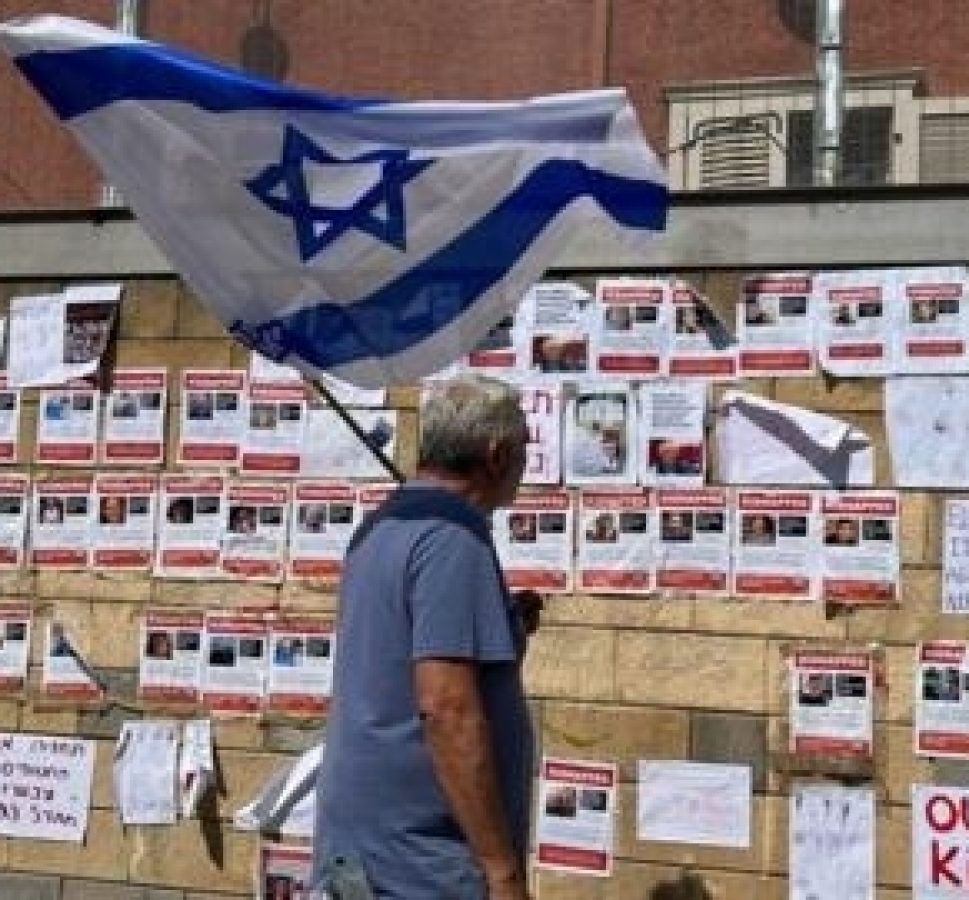
At least 199 people were abducted by Hamas and Islamic Jihad during the terrorist attacks on October 7. For their families back home, the uncertainty is agonising. More than a week later, Orian Adar and Keren Schem are still torn between hope and despair.
There are dark circles around Orian Adar’s eyes – she can’t sleep anymore. She has been waiting without hope for news of her “savta” – Hebrew for grandmother – for more than a week now. Yaffa Adar, 85 years old, was kidnapped by Hamas in the Nir Oz kibbutz, not far from the Gaza Strip.
“We were supposed to visit her that day. She loved those visits,” Orian says. “My two children are the joy of her life. She would do anything for them.”
On Saturday, October 7, Orian and her family woke early to the devastating news from southern Israel. She quickly realised the situation was serious, and that they would have to postpone their reunion. They joked on the family WhatsApp group about the enormous amount of food Yaffa would have to eat by herself. Then, just before 9am, everything changed.
“She told us there were terrorists in the kibbutz and that there was gun fighting in the streets. The first thing I said was ‘Grandma, be careful’.”
She never heard back.

Sitting beneath the constant hum of military helicopters, sheltered in her sister Adva’s garden, Orian is in tears.
“We were worried, but we didn’t realise the extent of what was happening. In the early afternoon, when the army finally arrived, they saw that the house had been turned upside down. But she wasn’t there,” Orian says. “My aunt, who had managed to escape the terrorists with her daughter after going through hell, called my father to tell him that grandma had disappeared.”
Orian, 34 years old, was sure Yaffa had been killed. She was distraught, thinking about how to break the news to the 2- and 5-year-old children when her husband showed her a video. “It was my grandmother sitting in a golf cart, being paraded through the streets of Gaza. She was indeed alive, but she was going through the worst thing a human being can endure. She was in the hands of Hamas.”

The propaganda videos and photos of Yaffa, with her short, snow-white hair, have gone viral. Draped in a pink blanket, her face is impassive.
“I didn’t watch the whole video. I couldn’t face the reality,” Orian says. “The next day, people asked me if she had Alzheimer’s, and if she understood what was happening. I felt insulted by these questions. How dare they?”
Only later did she understand. “Despite the evil around her, her face was peaceful,” she says. “She looked confident. She’s my grandmother. She helped build this country. She wouldn’t let anyone see her in a humiliating situation. It’s a façade. Inside, there’s an 85-year-old woman, alone and worried. She’s terrified, even if people find it hard to understand.”

Since the official confirmation of the kidnapping, Orian and her family cling to the hope of a release or a prisoner exchange – something for which there are strong precedents in Israel. In 2011, after more than four years in captivity in the Hamas tunnels in Gaza, the Franco-Israeli soldier Gilad Shalit was released in exchange for more than 1,000 Palestinian prisoners.
“If an 85-year-old woman ends her life suffering in captivity, it means we haven’t done enough,” Orian says. “The whole world is watching us. They must bring them back alive. Bring them back now!”
Orian holds on to the hope that international pressure will influence Hamas. She’s doing multiple interviews because it’s a race against time. “My grandmother doesn’t have time to wait. She must come home today, or we’ll retrieve a corpse. It breaks my heart to think she might die like this, even though sometimes when I think about the suffering she is enduring, I hope she’s no longer with us.”
After saying this, Orian composes herself. She has no right to say that, she says, especially out loud. She wants to have hope. “If the whole world pressures Hamas, the hostages will be returned … I don’t want my grandmother to die in captivity,” she says.
‘She’s a real warrior’
One hundred and ninety-nine. That’s the official number of people abducted, according to an Israeli Defence Force statement on October 16. Among the names, there is Mia Schem, a 21-year-old French and Israeli national. She was at the Tribe of Nova festival along with roughly 3,500 people during the Hamas attack. Her mother, Keren Schem, recounts how she called her daughter for hours, in vain.
Holding up two pictures of her daughter printed on an A4 piece of paper, Keren says that all she knows for sure is that Mia sent a Whatsapp message to a friend who was with her, saying, “They’re shooting at us. Please, come save us!” She says everything else she has heard is just rumours.
Mia and her friends apparently fled in a car when the first rockets started raining down on the site. The terrorists then targeted the tires to force them out of the vehicle and chased them down.
“When she sent this message, she was already injured,” Keren says. “They say that she has been shot in the leg, some say in the shoulder.”

Since then, Keren has not stopped trying to get her daughter back.
“All the information we have is information that we discovered [ourselves],” she said. “You know, we have friends in the army and friends in the hospitals and in the media. [No officials] called us. And last night, I discovered that my baby had been kidnapped. I don’t know if she’s alive or dead.”
Schem explains that the festivalgoers’ vehicles were burned by Hamas, and the bodies are unrecognisable. “This is a psychological war,” she says. “They are doing everything to bring mothers, sisters, and brothers into this chaos.”
The news came through that Mia had been kidnapped on Saturday, October 14, one week after she went missing. “I was so happy, it is so pathetic,” says Keren. “I was happy to hear that my baby is [being held captive by] the worst enemy in the world. I mean, God knows what she’s going through.”

Her hope lies in the actions of French President Emmanuel Macron. “I know that President Biden spoke on Zoom to the American families. And I really wish that President Macron would talk to us, too,” says Keren. “I really trust him and my baby, she’s a French citizen. I really want him to help me get my baby back.”
French Foreign Minister Catherine Colonna was in Tel Aviv this weekend to meet with the families of the French-Israeli hostages, including Keren. Keren, who’s just come from says Colonna was “a nice woman, a professional one,” and that she “trusts her”. Keren says the French have good relations with countries in the Middle East, and a good track record on human rights.
Keren is a single mother of four, but she’s always been able to rely on the help of Mia, who has been “like a little mother” to her younger brothers and sisters, she says. Keren says Mia cooks and paints, and that her creativity knows no bounds. Before she was kidnapped, Mia was taking courses to become a tattoo artist.
“She has a mind of a 50-year-old woman, not a 20-year-old girl. She’s so mature and she’s a real warrior;” she says. “I know that she is there with other people in Gaza, and I’m sure that she is taking care of them.”
“I’m begging the world to bring my baby back because she’s my best friend,” pleads Keren. “Take me. Bring my baby back. I’m begging you to bring her back alive.”






